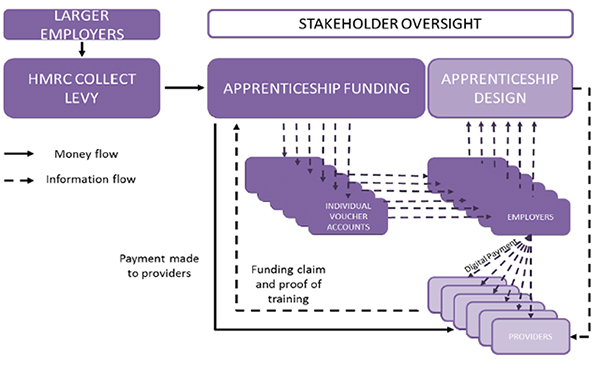A former principal of two colleges has been named as chair of a new steering group set up by the Skills Funding Agency (SFA) to support its work on simplifying the funding system for adult skills.
The SFA announced today that it has launched the new Funding Reform and Localism Steering Group (FRLSG) to “support our work on creating a simpler, more locally focused and responsive funding system for adult skills”.
“The group will help us shape how adult skills are funded, excluding apprenticeships, to meet local needs in a way that is simpler to operate,” an SFA spokesperson added.
She said that the chair will be Dr Ann Limb OBE, chair of the South East Midlands Local Enterprise Partnership (Lep), who was principal of Milton Keynes College from 1986 to 1996 and Cambridge Regional College from 1996 to 2001, before moving to the charitable and private sector.
Dr Limb (pictured) said: “This is a critical time for the FE sector and an opportunity to reinvigorate the sector’s long-standing connections with local employers and communities.
“As a Lep chair who has worked in the private sector for the last decade and a passionate advocate of FE, I’m pleased to have been asked to chair this group.”
The FRLSG will be made up of representatives from FE sector, Leps, and “combined authorities”, the SFA spokesperson said.
She told FE Week that The Association of Colleges (AoC) and Association of Employment and Learning Providers (AELP) would both be invited to join.
Gill Clipson, AoC deputy chief executive, said: “Colleges play a central role in providing a wide range of technical and professional qualifications which help adults to train for a new job or boost their skills in an existing role.
“We are interested in hearing more about the role of the steering group and would be keen to be involved to represent the interests of our members.
“Dr Limb is a passionate supporter of FE and we look forward to continuing our positive work with her. Adult skills funding has been cut by 28 per cent this year alone and we need to work together to protect this vital provision from further cuts.”
An AELP spokesperson said: “As well as apprenticeships, independent providers are heavily involved in the delivery of other adult skills provision, so we would be very pleased to be part of Dr Limb’s advisory group.
“The devolution agenda by definition will result in differing approaches adopted for skills in different areas, but there are important aspects such as funding arrangements with providers where some commonality in approach will be welcome to keep the system efficient and effective in terms of securing positive outcomes for employers and learners.”
Having reviewed the SFA’s existing advisory arrangements, the SFA spokesperson added, “our current groups, Funding External Technical Advisory Group (FETAG) and Qualifications Advisory Group (QAG) will cease to operate.
“We would like to thank both FETAG and QAG groups for the considerable support and commitment to the SFA over the last few years in implementing and embedding the current streamlined funding system and qualification funding reforms”.
“The advice members of FETAG and QAG have given has been invaluable,” she added.
The Data and Management Information Advisory Group (DMIAG), chaired by Dawn Ward CBE, principal of Burton and South Derbyshire College, will continue to offer advice to the SFA on the Individualised Learner Record (ILR), data collections and related issues, she added.




 highlight the need for young people leaving care to be given additional support to find a good job.
highlight the need for young people leaving care to be given additional support to find a good job. Mr Osborne (pictured left) announced plans for a levy on large businesses, to help fund
Mr Osborne (pictured left) announced plans for a levy on large businesses, to help fund  , Skills Minister Nick Boles (pictured below left)) and his predecessor Matthew Hancock (pictured above), who is the Cabinet Office Minister and also chairs the group, will implement plans to force unemployed 18 to 21-year-olds to start an apprenticeship, traineeship, or a paid or unpaid job.
, Skills Minister Nick Boles (pictured below left)) and his predecessor Matthew Hancock (pictured above), who is the Cabinet Office Minister and also chairs the group, will implement plans to force unemployed 18 to 21-year-olds to start an apprenticeship, traineeship, or a paid or unpaid job. The young claimants, she added, will “lose benefits” if they do not comply from April 2017.
The young claimants, she added, will “lose benefits” if they do not comply from April 2017.